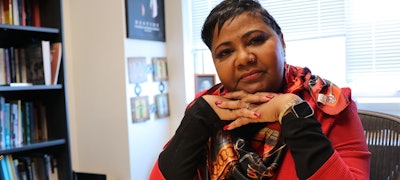 Dr. Don Pope-Davis
Dr. Don Pope-Davis
The historical proliferation of these assessments was spurred in part by French schools in the early 1900s, as white psychologists and psychometricians began to develop early theories and conjectures of learning, and to simultaneously acquire initial beliefs of intelligence, which remain today. Those children who did not pass were deemed “imbeciles” and removed from classrooms. The genesis of the testing movement created many tests, including the Stanford-Binet Test, which subsequently has been administered to millions of American schoolchildren. Also, all immigrants who came to the United States in the early 20th century via Ellis Island were given the Feature Profile Test on American history. Those who did not pass the test were called “feebleminded” and frequently sent back home.
Problematically, intelligence, aptitude and achievement tests are still used with dismissiveness. This continues a legacy of blatant disregard for cultural, linguistic and environmental influences in children’s development, resulting in subsequent interpretations and uses of scores — scores that often differ across racial, ethnic, linguistic and economic backgrounds. Social scientists like Herrnstein and Murray seized the moment in 1994 to capitalize on polemic, deficit-oriented and racist beliefs in their highly supported and highly contested book reminiscent of eugenics advocates.  Dr. Donna Y. Ford
Dr. Donna Y. Ford
Within this context, the American Psychological Association (APA) recently issued a long-overdue apology for the harm the organization and its member psychologists have done in perpetuating systematic racism and its complicit role in exacerbating myths around racial hierarchies, particularly regarding Black communities. APA acknowledges its role in perpetuating racism under the guise of science and the façade of objectivity. The association now more directly proclaims that “race is a social construct with no underlying genetic or biological basis.”
As Black scholars and leaders in psychology, counseling and education, we strive to expose and mitigate barriers that regularly inhibit educational progress and outcomes for Black and other vulnerable groups. With this in mind, we challenge prevailing moral and social beliefs that permeate institutions. We endeavor to shape more reasonable and moral standards that address structural racism that has served to maintain the status quo.
The Association of Black Psychologists also issued a response. They concluded: “To accept the APA’s apology would be to accept the accuracy of a fabricated historical record and negate the mission and vision of the Association of Black Psychologists.” To our disappointment, to date, responses from other professional organizations are noticeably absent. One exception is the American Psychiatric Association.




















